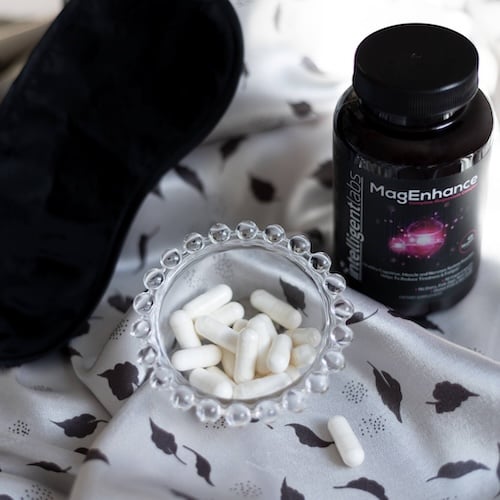If you’ve ever found yourself tossing and turning at night, you’ve likely wondered about the best over-the-counter (OTC) sleep aid. Among the many options available, magnesium and melatonin often stand out as top contenders. But how do they compare, and which one is right for you? Keep reading to find out!
Table of Contents
Magnesium vs. Melatonin: Which Sleep Aid Works Better?
Magnesium and melatonin are widely used to promote better sleep, but they work in different ways.
Magnesium is a mineral essential for hundreds of biochemical reactions in the body, including those that regulate muscle and nerve function, energy production, and sleep.1
Melatonin, on the other hand, is a hormone naturally produced by the pineal gland in your brain. It regulates your circadian rhythm — the internal clock that tells you when to feel awake and when to sleep. Melatonin levels naturally rise in the evening, helping your body transition to sleep.2
So, Which Sleep Aid Should You Choose?
Your choice between magnesium and melatonin depends on your specific sleep concerns.
- Magnesium might be a better option if you struggle with stress, muscle tension, or restless legs. It’s also generally recommended for improving sleep quality over the long term. Check out our science-backed guide to find out which type of magnesium works best for sleep.
- Consider melatonin if your sleep schedule is off due to travel, shift work, or other short-term sleep disruption.
With that said, some individuals may find that combining magnesium and melatonin delivers the best results. Taking both sleep aids may help you fall asleep faster and stay asleep longer.
Can You Take Magnesium and Melatonin Together?
Yes, magnesium and melatonin can be taken together, and in many cases, combining them enhances their sleep-promoting effects.
Magnesium naturally supports your body’s melatonin production,3 so pairing it with melatonin could provide a synergistic benefit.

When combining these supplements, timing, and dosage are important:
For our MagEnhance Magnesium Complex, the standard dosage is 3 capsules a day. This is sufficient to help with sleep, correct a magnesium deficiency, and maintain healthy levels in the body.
For melatonin supplements, doses typically range from 1-3mg. Be sure to read the label for specific instructions to get the most out of your melatonin.
That said, everyone’s body is different, so consulting a healthcare provider before combining supplements is a good idea.
Why Do You Need Sleep Aids, Anyway?
Sleep aids are substances or medications designed to help you fall asleep, stay asleep, or improve the overall quality of your rest. They range from OTC options like magnesium and melatonin to prescription medications for more severe sleep disorders.4
Sleep problems are a widespread issue that affects people across the globe. In the United States, about 1 in 3 adults report sleeping less than the recommended seven hours per night.5 In Europe, authorities estimate that 1 in 10 adults suffer from chronic insomnia, with the numbers expected to increase. 6
The consequences of poor sleep extend beyond nighttime fatigue. Persistent lack of rest can disrupt daily life and can snowball into a host of health issues, including obesity, high blood pressure, diabetes, heart disease, stroke, frequent mental distress, and even death.4 7
The Bottom Line
When it comes to the best sleep supplement, both magnesium and melatonin offer distinct advantages. A high-quality magnesium supplement, such as our MagEnhance, is a versatile, long-term option that supports relaxation and sleep quality, while melatonin provides quick relief for specific sleep disruptions. In some cases, using them together may be the most effective solution.
To optimize your sleep, pair your favorite OTC sleep aids with a healthy bedtime routine. Keep your bedroom cool and dark, establish a consistent bedtime, and avoid screens before bed. If sleep issues persist, consult a healthcare provider to address any underlying conditions or find the right combination of interventions for you.
💬 What about you? Have you tried magnesium, melatonin, or any other OTC sleep aids? What worked best for you? Share your experience below!
📩 Want more sleep and wellness tips? Sign up for our newsletter for expert insights and exclusive offers!
References:
- Al Alawi, Abdullah M., et al. “Magnesium and Human Health: Perspectives and Research Directions.” International Journal of Endocrinology, vol. 2018, no. 1, 16 Apr. 2018, pp. 1–17, https://doi.org/10.1155/2018/9041694. ↩︎
- Savage, Rosemary A., et al. “Melatonin.” PubMed, StatPearls Publishing, 2024, www.ncbi.nlm.nih.gov/books/NBK534823. ↩︎
- Abbasi, Behnood, et al. “The Effect of Magnesium Supplementation on Primary Insomnia in Elderly: A Double-Blind Placebo-Controlled Clinical Trial.” Journal of Research in Medical Sciences : The Official Journal of Isfahan University of Medical Sciences, vol. 17, no. 12, Dec. 2012, p. 1161, pmc.ncbi.nlm.nih.gov/articles/PMC3703169 ↩︎
- “Sleep Aids.” Hopkinsmedicine.org, 27 Aug. 2024, www.hopkinsmedicine.org/health/wellness-and-prevention/sleep-aids. ↩︎
- Liu, Yong, et al. “Prevalence of Healthy Sleep Duration among Adults — United States, 2014.” MMWR. Morbidity and Mortality Weekly Report, vol. 65, no. 6, 19 Feb. 2016, pp. 137–141, https://doi.org/10.15585/mmwr.mm6506a1. ↩︎
- Ellis, Jason et al. “Chronic Insomnia Disorder across Europe: Expert Opinion on Challenges and Opportunities to Improve Care.” Healthcare (Basel, Switzerland) vol. 11,5 716. 28 Feb. 2023, doi:10.3390/healthcare11050716 ↩︎
- Insomnia. https://aasm.org/resources/factsheets/insomnia.pdf ↩︎




